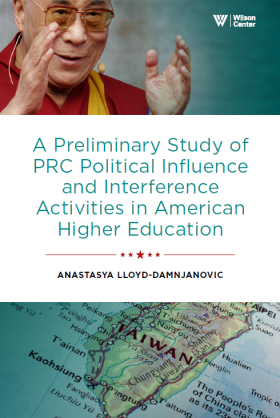A Preliminary Study of PRC Political Influence and Interference Activities in American Higher Education


U.S. colleges and universities create knowledge—and promote American well-being—through their exercise of academic freedom and openness. Openness demands that American universities admit the world’s best students, many of whom are Chinese. Academic freedom requires that all scholars in the United States respect principles of free inquiry and critical discourse, regardless of their countries of origin. With China as the greatest source of foreign students to the U.S., and with China’s authoritarian government summoning students to serve a motherland engaged in worldwide competition with the U.S., prudence dictates a close look at the impact of Chinese students and the Chinese officials charged with managing them on American campuses.
Anastasya Lloyd-Damnjanovic’s research advances American understanding of this emergent issue. Her findings, which the Wilson Center’s Kissinger Institute on China and the United States presents in these pages, are cause for heightened vigilance and cautious optimism. Her preliminary report is the most comprehensive survey to date of the experiences of faculty, students, and administrators coping with the impact of China’s political agenda and educational culture on American campuses. Through hundreds of interviews and cogent analysis, she identifies trends that will concern American educators and policymakers, but also finds that American universities are well-equipped to manage the challenge, particularly if they work with each other and share information with government agencies charged with protecting national security. The Wilson Center is proud to partner with the Stephen A. Schwarzman Education Foundation in sponsoring Anastasya Lloyd-Damnjanovic’s work as a Schwarzman Associate and welcomes discussion of her research. Please send comments and questions on the evolving issues addressed in this report to the Kissinger Institute at China@wilsoncenter.org.
Author

Schwarzman Scholars, University of Oxford

Kissinger Institute on China and the United States
The Kissinger Institute works to ensure that China policy serves American long-term interests and is founded in understanding of historical and cultural factors in bilateral relations and in accurate assessment of the aspirations of China’s government and people. Read more

Explore More
Browse Insights & Analysis
Talking to the Dead to Heal the Living

Russia’s Indigenous Communities and the War in Ukraine

